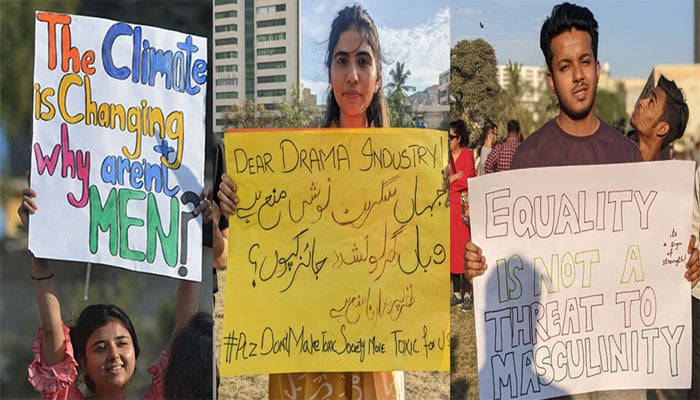Aurat March calls for financial empowerment of women in times of inflation
"Riyasat jawab do, bhook ka hisab do" was central theme for this year's Aurat March
Nadeem Abbas and Farhat Nadeem from Sindh’s Badin district tied the knot a few years ago. The married couple helps each other grow professionally.
They understand the importance of the inclusion of women in the economy and their financial emancipation which helps them actively contribute to running house expenses during the time of this rising inflation.
The couple, who does not believe in predefined gender roles, participated in the Aurat March in Karachi on Sunday afternoon. They said they believed in the demand for financial empowerment of women made at the Aurat March.
“I heat my own food. I prepare tea not for myself but for my wife as well,” said the husband. The rather young married couple came all the way from Badin to become part of the Aurat March gathering that was held at the Burnes Garden.
Working women of our society, he said, after doing eight–hour duty manage their homes as well. “This is sheer injustice,” he stressed. “Only if we understand that men can also do housework, the issue of gender roles could be resolved in our society.”
Abbas said that he supported the cause of Aurat March and wanted to quit the privileges that men enjoyed in a patriarchal society. The patriarchal culture, he said, needed to be changed through radical feminism.
This year, the Karachi chapter of the Aurat March came with a rather different demand of cutting public expenditure, both civilian and military, and directing that amount to the people of Pakistan, especially for the rehabilitation of the flood-hit families. One of the organisers of the Aurat March, Zoha Alvi, during a stage performance said that when they talked about cuts in the expenses of government officials and non-civilian budgets, critics asked what that had to do with the women. “We are asked what inflation and hunger have to do with women empowerment?”
She asked whether women were not part of our society and if the high inflation did not impact them. She said that economically sound women would be safe in any society.
The Aurat March management demanded ending lavish spendings such as those on golf clubs and housing schemes, slashing bureaucrats’ extravagant benefits and civilian governments’ extraneous expenditure, especially due to duplicate ministries and divisions at federal and provincial levels.
The Aurat March in Karachi this year was held on March 12 instead of its traditional date of March 8 when International Women’s Day is observed.
Explaining the reason for the change of date, the Aurat March management said they wanted to have more working-class women in the march, which could not have been possible on a weekday, due to which they decided to hold the march to Sunday.
The organisers said this year’s march was specifically against hunger and high inflation, and how it was breaking the back of the working class, especially their women and children.
“The female workforce participation of Pakistan is 22 per cent,” said one of the organisers of the Aurat March, Atiya Abbas. This, she said, is one-fourth of the entire population of the country, whereas, women make up 49 per cent of the country’s population. “This is an abysmal number and abysmal kind of representation of their economic ability.”
If half of the population is not contributing to the economy, she said, they are not contributing to the Gross Domestic Product of the country. If we don’t count housework, child care, and domestic labour, she said, it means we are not counting millions of women who are actually keeping the economy running.
-
 Eric Dane's Girlfriend Janell Shirtcliff Pays Him Emotional Tribute After ALS Death
Eric Dane's Girlfriend Janell Shirtcliff Pays Him Emotional Tribute After ALS Death -
 King Charles Faces ‘stuff Of The Nightmares’ Over Jarring Issue
King Charles Faces ‘stuff Of The Nightmares’ Over Jarring Issue -
 Sarah Ferguson Has ‘no Remorse’ Over Jeffrey Epstein Friendship
Sarah Ferguson Has ‘no Remorse’ Over Jeffrey Epstein Friendship -
 A$AP Rocky Throws Rihanna Surprise Birthday Dinner On Turning 38
A$AP Rocky Throws Rihanna Surprise Birthday Dinner On Turning 38 -
 Andrew Jokes In Hold As BAFTA Welcomes Prince William
Andrew Jokes In Hold As BAFTA Welcomes Prince William -
 Sam Levinson Donates $27K To Eric Dane Family Fund After Actor’s Death
Sam Levinson Donates $27K To Eric Dane Family Fund After Actor’s Death -
 Savannah Guthrie Mother Case: Police Block Activist Mom Group Efforts To Search For Missing Nancy Over Permission Row
Savannah Guthrie Mother Case: Police Block Activist Mom Group Efforts To Search For Missing Nancy Over Permission Row -
 Dove Cameron Calls '56 Days' Casting 'Hollywood Fever Dream'
Dove Cameron Calls '56 Days' Casting 'Hollywood Fever Dream' -
 Prince William, Kate Middleton ‘carrying Weight’ Of Reputation In Epstein Scandal
Prince William, Kate Middleton ‘carrying Weight’ Of Reputation In Epstein Scandal -
 Timothée Chalamet Compares 'Dune: Part Three' With Iconic Films 'Interstellar', 'The Dark Knight' & 'Apocalypse Now'
Timothée Chalamet Compares 'Dune: Part Three' With Iconic Films 'Interstellar', 'The Dark Knight' & 'Apocalypse Now' -
 Little Mix Star Leigh-Anne Pinnock Talks About Protecting Her Children From Social Media
Little Mix Star Leigh-Anne Pinnock Talks About Protecting Her Children From Social Media -
 Ghislaine Maxwell Is ‘fall Guy’ For Jeffrey Epstein, Claims Brother
Ghislaine Maxwell Is ‘fall Guy’ For Jeffrey Epstein, Claims Brother -
 Timothee Chalamet Rejects Fame Linked To Kardashian Reality TV World While Dating Kylie Jenner
Timothee Chalamet Rejects Fame Linked To Kardashian Reality TV World While Dating Kylie Jenner -
 Sarah Chalke Recalls Backlash To 'Roseanne' Casting
Sarah Chalke Recalls Backlash To 'Roseanne' Casting -
 Pamela Anderson, David Hasselhoff's Return To Reimagined Version Of 'Baywatch' Confirmed By Star
Pamela Anderson, David Hasselhoff's Return To Reimagined Version Of 'Baywatch' Confirmed By Star -
 Willie Colón, Salsa Legend, Dies At 75
Willie Colón, Salsa Legend, Dies At 75




